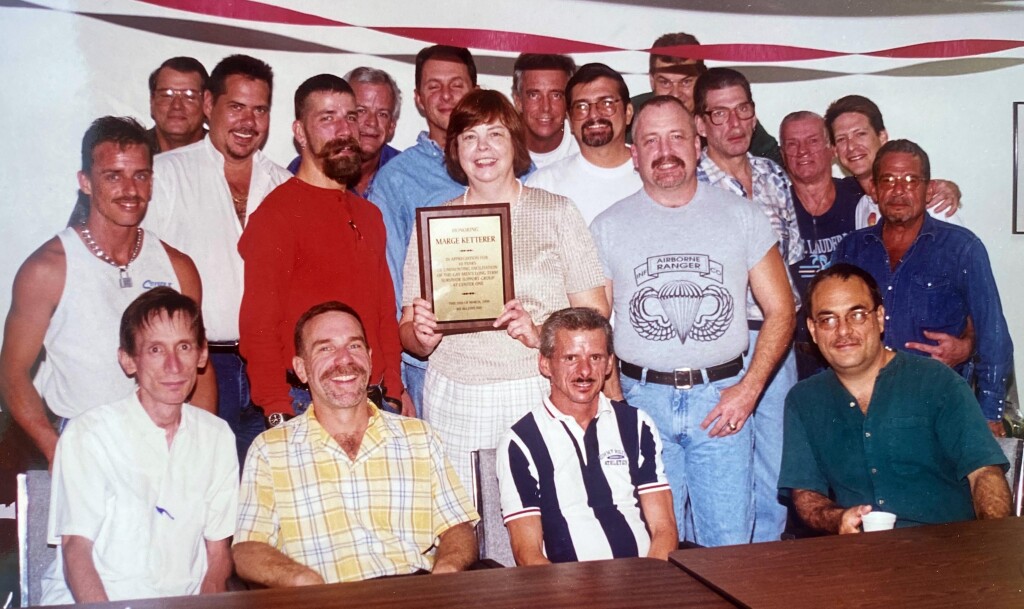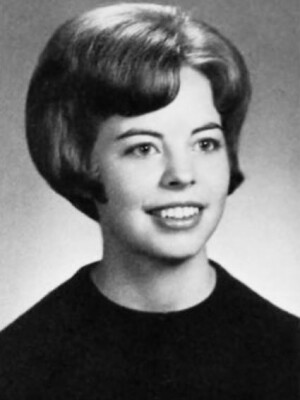
By ALAN SIMMER ’07 | Photos SUBMITTED
A mysterious illness, spreading through unknown means, leaving death and grief in its wake. While those words likely conjure the early days of COVID-19 for many, Margie Mowry Ketterer ’67 will always think of the height of the AIDS crisis in the 1980s and ’90s.
“They talk about the fatigue with the medical workers and all of that, that sounds familiar to me,” Ketterer said. “I call it my war experience, because people were dying all of the time.”
As a social worker, Ketterer had a front-row seat to the devastation HIV/AIDS wrought on the gay community in Florida, where she’s lived for decades. She’s been a volunteer moderator for a support group of men living with HIV/AIDS since 1989.
“There was always somebody that I knew from my group going to the hospital,” Ketterer said. “When you’re in a thing like that, you learn to really live in the present, in the moment. We’d go to two funerals one week, and we’d be at a picnic the next week for the 4th of July. And we’d be having a good time at the picnic. You just lived; it was intense.”
Ketterer graduated from Wartburg with a degree in social work, which she put to use in Fort Lauderdale, Fla. Eventually, she went back for a master’s degree in mental health counseling at what is now Nova Southeastern University.

To finish her degree, Ketterer needed an internship, and her professor handed out cards with possible placements.
“Ninety-eight percent of the list he gave us was the exact same work I was already doing: family and kids, family and kids, nothing different,” she said.
Due to the stigma surrounding HIV/AIDS, Ketterer was the only one in her class to check the option for AIDS patients — so that’s where her professor sent her. As part of her internship, she was asked to run a support group for gay men living with AIDS.
“And I loved it,” she said. “I really liked it, and I stayed with it.”
More than 30 years later, she still catches up with the group twice a month — sometimes online, due to the pandemic. Thanks to continual advances in treatment for HIV/AIDS, members now have more time to talk about everything from other health issues to the little joys and frustrations of each day.
“We’re like a senior support group for each other now,” Ketterer said. “I have the same problems they do.”
“It’s almost like going to a roundtable discussion of doctors,” said Brian Vodicka, who has been in the group for more than six years. “And then the group offers support and ideas.”
Vodicka joined the group after moving to Florida from Texas, where he did not have a similar support system.
“It means everything in the world,” he said. “You have a circle of friends that will drop anything they’re doing if you’ve got an emergency.”
Though the format and membership of the group may change, Ketterer continues to do what she always has: provide a friendly ear, good advice, and resources for help.
“Marge is the main anchor. She’s the main rock,” said Vodicka. “Marge is a very loving human being, and we have been blessed to have known her.”
Members like Vodicka aren’t shy about showing their appreciation. She was honored in 1999 (pictured above) for 10 years of “undaunting facilitation” with a plaque stating, “We all love you.” A few years ago, the group surprised Ketterer with a dinner and another plaque in honor of 30 years of service.
“Now we’re just not counting because we’re all getting too old,” she said.
